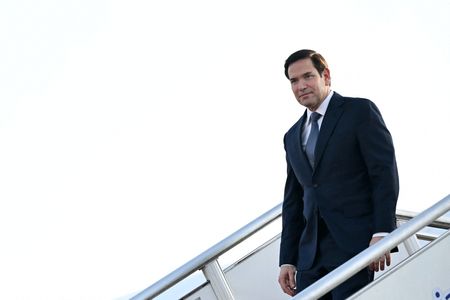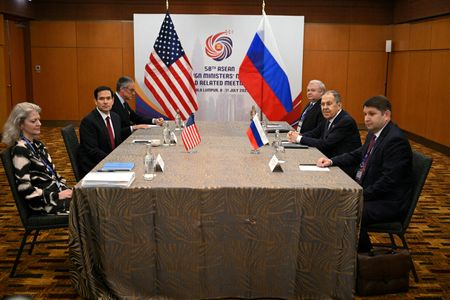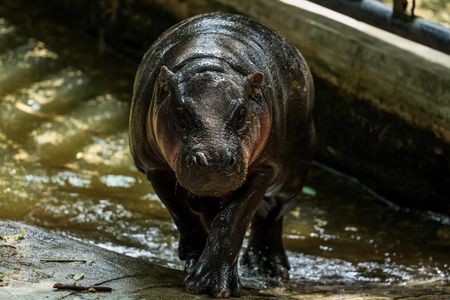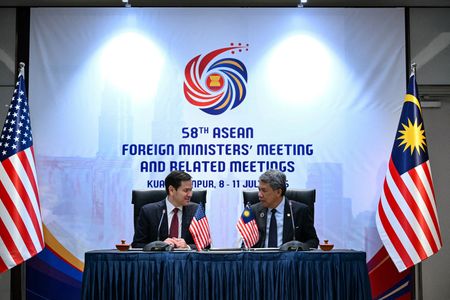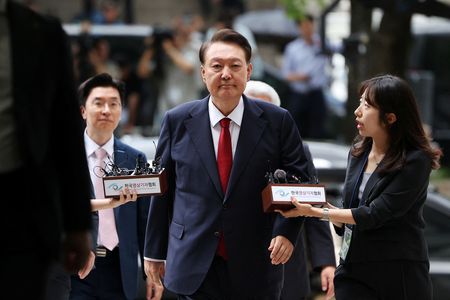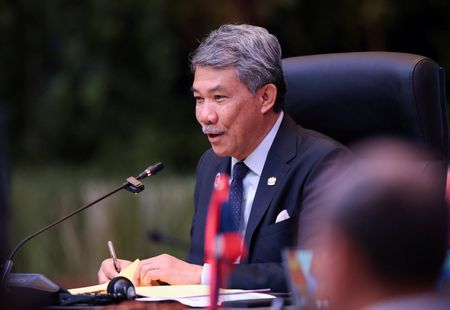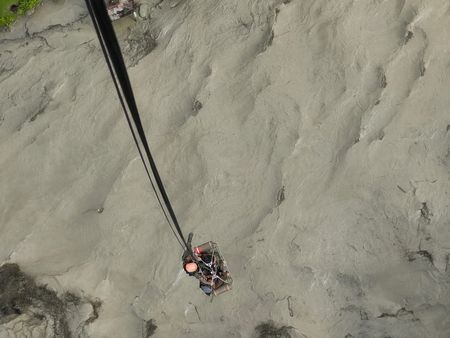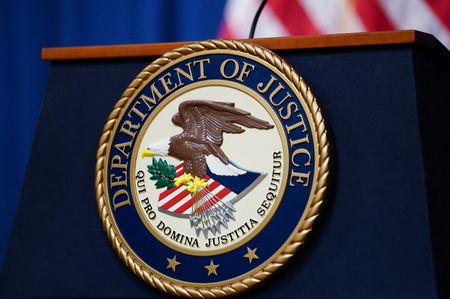By Daphne Psaledakis and Rozanna Latiff
KUALA LUMPUR (Reuters) -U.S. Secretary of State Marco Rubio met counterparts in Southeast Asia on Thursday during his first visit to Asia since taking office, reassuring them it is a priority for Washington despite President Donald Trump’s tariff offensive.
Washington’s top diplomat joined foreign ministers of the 10-member Association of Southeast Asian Nations in Kuala Lumpur at a meeting that includes Australia, China, the European Union, Japan, Russia, South Korea and Russia, and others.
The visit is part of an effort to renew U.S. focus on the Indo-Pacific and look beyond conflicts in the Middle East and Europe that have consumed much of the Trump administration’s attention.
“The story of the next 50 years, will largely be written here in this region,” Rubio told ASEAN ministers, describing the Indo-Pacific as a “focal point of U.S. foreign policy”.
“When I hear … that perhaps the United States or the world might be distracted by events in other parts of the planet, I would say distraction is impossible,” added Rubio, who doubles as national security adviser.
However, Trump’s global tariff strategy has cast a shadow over the trip after he unveiled steep tariffs from August 1 on seven ASEAN members, including Malaysia, as well as on close Northeast Asian allies Japan and South Korea.
Rubio will nevertheless seek to firm U.S. ties with partners and allies unnerved by the tariffs, and is likely to press the case that the United States remains a better partner than China, Washington’s main strategic rival, experts said.
“This is significant, and it’s an effort to try to counter that Chinese diplomatic and economic offensive,” said Victor Cha, of Washington’s Center for Strategic and International Studies.
“We’re seven months into the administration. Usually, these happen much sooner. But then again, it is extraordinary circumstances… But I guess better late than never.”
FRANK EXCHANGE
Rubio held talks with Russian Foreign Minister Sergei Lavrov, their second in-person meeting, at a time when Trump has grown increasingly frustrated with Russian President Vladimir Putin as the war in Ukraine drags on.
Rubio said he had a frank and important discussion and reinforced Trump’s disappointment that there has not been more flexibility on the Russian side.
“We need to see a roadmap moving forward about how this conflict can conclude,” Rubio said after the 50-minute meeting.
Russia’s foreign ministry in a statement said there was “a substantive and frank exchange of views” on the situation around Ukraine, Iran and Syria.
Lavrov also met Chinese counterpart Wang Yi, who said the two countries should strengthen coordination to promote Middle East peace and push for dialogue on the Iran nuclear issue.
“Peace cannot be achieved through force, and applying pressure won’t solve problems,” Wang said, according to the foreign ministry in Beijing.
Wang separately pledged China’s help to ASEAN in enhancing their capacity to implement the Regional Comprehensive Economic Partnership, an Asian trade pact Beijing is backing.
On Monday, a senior State Department official said Rubio’s priorities included reaffirming Washington’s commitment to the region, with security cooperation a top priority, including the South China Sea, transnational crime, narcotics, scam centers, and people-trafficking.
Rubio would be prepared to discuss trade and reiterate that the need to rebalance U.S. trade relationships was significant, the official said on condition of anonymity.
In addition to their tariff unease, many have doubts about the willingness of Trump’s “America First” administration to fully engage diplomatically and economically with the region.
Trump has imposed tariffs of 25% on Japan and South Korea and on ASEAN nations, a levy of 25% on Malaysia, 32% on Indonesia, 36% on Cambodia and Thailand, and 40% on Laos and Myanmar. He has also stepped up to 20% from 17% the tariff on U.S. defence treaty ally the Philippines.
PERFECT STORM
Export-reliant ASEAN is collectively the world’s fifth-biggest economy. Only Vietnam has secured a deal with Trump to lower its levy to 20% from an initial 46%.
Trump has also upset another key Indo-Pacific ally, Australia, which said on Wednesday it was “urgently seeking more detail” on his threat of 200% tariffs on pharmaceutical imports.
At a meeting with ASEAN, China, Japan and South Korea, Malaysia’s Foreign Minister Mohamad Hasan said Asia was being tested and is facing “the perfect storm”.
“Unilateralism and nationalism are on the rise, marginalising multilateralism that is essential for a stable world order,” he said.
Rubio also met Malaysian Prime Minister Anwar Ibrahim and discussed building resilient critical mineral supply chains and security of AI chip technologies, the U.S. State Department said.
It did not mention trade. But in a video from Anwar’s office, the premier said tariffs were the first item for discussion.
“He knows Malaysia is a major trading country for them in this region and he pledged to consider and extend our views (to Trump),” Anwar said.
A draft joint ASEAN communique seen by Reuters, preceding news of the latest tariff rates, shows that ASEAN foreign ministers, without specifically mentioning the U.S., will express concern about rising global uncertainties “particularly the unilateral actions relating to tariffs”.
(Reporting by Daphne Psaledakis, Rozanna Latiff and Danial Azhar in Kuala Lumpur; Liz Lee in Beijing, David Brunnstrom in Washington and Lucy Papachristou; Editing by Martin Petty, Clarence Fernandez and Chizu Nomiyama )

